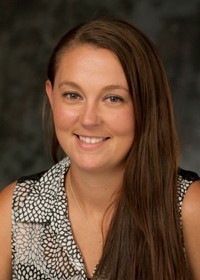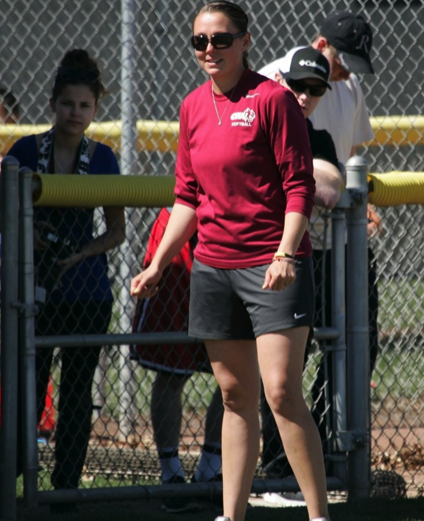Q and A with head softball coach Mallory Holtman-Fletcher
February 27, 2015
Q – What do you enjoy doing on your down time when you’re not coaching?
A – Playing with my son, I have a three year old.
Q – How did you end up getting the job as head coach?
A – I played here for five years, and I was assistant [coach] for two. I told the old head coach, [Gary], that I wanted his job. He was 72 years old so he was waiting to retire. He said he would retire when I got my graduate degree, so when I graduated he retired, like, two weeks later.
Q – What’s a typical workday like?
A – Come in, check emails, talk to the athletic trainer, [Charity], just to see if everyone’s healthy, work on practice plans, recruiting…Every day’s a little bit different which is nice. Just making sure everything is running and smooth, checking on the players, making sure classes are going good.
Q – What do you look for when recruiting an athlete?
A – Someone that fits with our team culture and what we’re working toward. One thing Gary taught me is that you can have a whole team of all-stars but if they don’t get along, you’re still not going to win a game. But if you have a team of average players that want to be there for a common cause, you’re going to win. That’s what we try to build our team on: people that want to work hard and people that have that teammate philosophy.
Q – What do you think you bring differently to coaching than the last coach?
A – Recruiting is different, it’s so high-tech now, and you can text your recruits now. Gary was one of my biggest mentors; I think he taught me the base of all my knowledge. It all just evolves as you coach.
Q – How do you sell Central to a recruit you really want?
A – I sell them on family first, which is Central. You walk through these hallways as an athlete and the other coaches know your name, Sammy, the S-I-D, knows who you are and knows your stats, and all of the other athletic trainers know who you are and care about who you are. Ninety-five percent of our players after freshmen year live off campus with one another because they still want to be around one another at the end of the day, even after they’ve spent 30 hours of the week together. We sell them on that concept first. For parents, this town is awesome. It’s safe; you’re close to cities but it’s a communal feel and you don’t have to worry about your kid. Academically, I think Central offers so much, and I think our success helps sell us. Of any GNAC school, we’ve been the most successful, if you look at the last five years.
Q – Has there ever been a time in your softball career when you wanted to quit?
A – I think as a player there have been times where there have been difficulties, but I’ve never wanted to quit. I had five surgeries in five years and those are the times you just want it more. You think about how much it sucks to just sit back and watch. As a coach, there are trying times and there are difficult situations. Those first two years are big learning years. I used to always see Gary at practice and think how much fun it is to go to practice and go to games and then you realize that you’re literally in the office seven hours a day doing paperwork. Central is where I went to school and it’s where I feel like I belong, so I don’t think I’ve ever got to that point where I was just done with it.
Q – When did you decide that softball was your passion?
A – Probably my sophomore year of high school. I still played all three sports throughout my senior year: softball, volleyball, and basketball, just because I can’t sit down, but I knew then that softball was what I wanted to do.
Q – What’s been the highlight moment for you as a coach?
A – Each season brings a different highlight. That’s one cool thing about coaching, that the players transition every year. My first year coaching was awesome. I remember moments during those games and playoffs that were so much fun to just be around that group of girls. To have your first year of coaching experience and have a team that has two All-Americans set the homerun record in the nation, those are great moments. Even just last year, going to Dixie and beating Humboldt State, sending Humboldt and San Diego home in the same day, and the girls being so pumped they just get back to the hotel and jump into the pool in full uniform. There’s stuff like that where you just forget about the winning and losing, but just the experiences that we’re having are amazing. Every game is a new highlight. Even in Vegas last week, we had a couple extra hours as a team and climbed up these giant boulders in Red Rock Canyon. Stuff like that that you don’t get to experience all the time. I sometimes feel like I see my players more than I see my three-year-old son, so the fact that you get to share these types of experiences with people you care about is awesome.

Q – During the game against Western Oregon University in 2008, what triggered the thought to assist Western Oregon’s Sara Tucholsky in running the basses after she injured her knee?
A – For me, at the time, it was just like, “I know your team can’t help you, but I could help you.” It seemed like the right thing to do, it wasn’t a strategic thing or planned out, it just came out. No one really thought anything of it. At the time, it was mentioned maybe in the seventh paragraph of the senior day column, no one really talked about it or thought about it. Another thing that Gary taught us is to just be selfless, and my parents taught me to just do the right thing and win gracefully and lose gracefully, too. We try to really stress being selfless and I think that’s really helped players get closer and making it more about somebody else doing something right than about yourself doing something wrong.
Q – Can you describe the moment you first found out you were going to the ESPYs?
A – I was in Jerrol’s bookstore buying books; I think I was buying notebooks or something. I got a phone call and they were like, “Oh yeah, you got nominated for an ESPY,” and I was like, “What the heck are people talking about?” It was really weird. It’s not something that I thought about. Everything kind of snowballed after that. I think I was in shock for a while. Honestly, that whole summer after it happened was a blur because it all happened so quickly. It was great publicity for the school and for our program and for softball and sportsmanship in general. At that time there was so much bad stuff in athletics going on. It’s still mind-blowing to me that I walk in my living room and see an ESPY,. It’s weird.
Q – What was it like getting to be on stage with Justin Timberlake?
A – It was fun. We got to go early and run through practice with them and practice picking him up. It was hilarious. He was really nice. It was all just super surreal. That whole experience just getting to sit in the front row and sitting in front of Will Ferrell instead of seeing him from afar, it was all just weird. I look back at pictures and still have to be like, oh my gosh.
Q – What’s the greatest piece of advice that you’ve been given?
A – My parents have this plaque in their house…it says “because nice matters.” My mom would always be on me about being nice and losing gracefully. Even if I didn’t do something wrong it was just something she, my dad and all my coaches instilled in me. I wanted to be that player that when I played, at the end of the day, the other teammates didn’t hate me and the other players on other teams didn’t think I was stuck-up. I wanted to be someone that people respected. Just being nice is something that really matters; I’m a big believer in karma.
Q – What do you want your legacy to be?
A – I just want this program to have a legacy of success. What Gary built and handed to me was the tipping point, we’re on the verge of having something great here. I want to take that and build something that is not just on the verge but is great. I want to be a powerhouse in our conference. I want to be a powerhouse in the nation, and I want it to be that if I left tomorrow, that wouldn’t stop. As a coach, I don’t want it to be about me. I want to be in the shadow to these players. If I could build All-Americans all day and leave and still have it going, I’m completely fine with that.
Q – Complete this sentence: “My coaching career has been successful if…”
A – If it stuck to who I was as a person.



